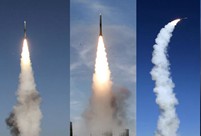

In producing the documentary, Mundell interviewed prominent figures such as former secretary of state Madeleine Albright, Chinese businessman Wang Jianlin, first chief executive of Hong Kong Special Administrative Region C.H. Tung, and also ordinary Chinese and Americans. So far he has accumulated more than 700 hours of footage.
"The film won't be a talking essay. It doesn't commemorate a special event in history, it will be deep and emotional, connected by a common theme, through narration," he said.
In one sequence, Mundell and his team traveled to one of America's poorest counties, Thomasville, Alabama, to film the stories of two American women whose lives changed when a Chinese company opened a copper plant, bringing 300 new jobs and new life into a community that hadn't seen any real investment in 45 years.
"I hope that when the Chinese watch the sequence, they cannot help but feel a great sense of pride. And when the American watch, they can have a chance to change the stereotype that Chinese investment will always lead to loss of jobs," Mundell said.
In another sequence, an ex-U.S. Marine started a new career and rebuilt confidence in life, not at home, but in Shanghai, where he was voted one of the best teachers. He describes life as realizing American dream in China.
"Each story was carefully chosen to illuminate some unique and perhaps little-known facet of the relations, and each one could provide audience with fresh insights," he said. "I hope it will surprise, shatter myths, and move people."
When Mundell began work on the film, he thought quite differently. "I thought I was going to find the magic bullet, the most innovative policies, things that have not got enough air time in policy circles. Then halfway through filming, we realized that none of these policies could flourish if we do not fix the infrastructure of the relationship," he said.
"In attempting to shift public opinion about each other, we got something unexpected. I think we made a film about Americans and Chinese rediscovering who they are at their core."
The film, which has cost three million U.S. dollars to make, aims for a global theatrical release later this year.
"We are not whitewashing the differences. We want to remind people be sufficiently open-minded to create an opening in the bilateral relationship," Mundell said.
 |
 4-year-old cute 'monk' spends summer holiday in temple
4-year-old cute 'monk' spends summer holiday in temple College graduates shining on the red carpet in Nanjing
College graduates shining on the red carpet in Nanjing PLA soldiers launch guided missiles in confrontation exercise
PLA soldiers launch guided missiles in confrontation exercise One woman’s fight against dog eaters
One woman’s fight against dog eaters Beautiful and smart - post-90s college teacher goes viral
Beautiful and smart - post-90s college teacher goes viral Top 10 luxury houses in the world
Top 10 luxury houses in the world  National Geographic: best photos during journey
National Geographic: best photos during journey Couples who engage in meaningful and deep conversations are happier
Couples who engage in meaningful and deep conversations are happier Maldives resort rated best hotel of 2015
Maldives resort rated best hotel of 2015  Global attitude poll reinforces old thinking
Global attitude poll reinforces old thinking Luxembourg scholar explodes myths about Tibet independence
Luxembourg scholar explodes myths about Tibet independence Smuggled meat came via Vietnam: official
Smuggled meat came via Vietnam: official Mentally ill confined at home due to lack of resources and public education
Mentally ill confined at home due to lack of resources and public educationDay|Week